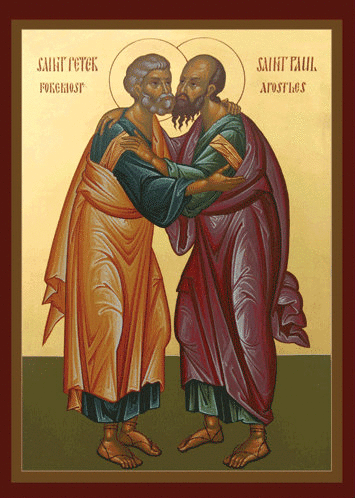In today’s Post I am plagiarizing myself.
I’ve written so many Posts that often I can’t remember them. I had a vague memory of writing long ago about forgiveness, so I looked back and, sure enough: Post 55. It was like reading someone else’s writing. I thought some of it (forgive my pride) was really good and worth repeating *, and some of it (forgive me) was confusing and could have been said much better. So I decided to rewrite it on the spot, and before it was done I had a partially new Post, which follows.
- If I couldn’t remember it, I figured you probably wouldn’t either.
![]()
But before we get to that, since this Sunday is Saint Patrick’s Day, you might want to check this out: https://frbillsorthodoxblog.com/2018/03/22/57-saint-patrick-celtic-orthodox-roman-catholic-anglican-coptic/
Forgiveness Sunday

Here it is in a nutshell: If you hesitate to come to Forgiveness Vespers this Sunday because someone you are mad at might be there – someone you haven’t made up with, someone you have not apologized to, someone you have not forgiven – if you die like this, get hit by a truck or get shot on the way home (you readers who are not in the United States, please understand), you’ll probably go to Hell. If there is anyone you haven’t forgiven, your salvation is in danger.
Because of this Sunday’s Gospel (Matthew 6:14-21), the day is popularly called Forgiveness Sunday. The Orthodox Church provides us with a beautiful way to enter Great Lent: “Forgiveness Vespers”. At the end of the service, all come forward and one by one ask each other’s forgiveness: “Forgive me a sinner.” “Forgive me a sinner”, as we exchange the peace in the Orthodox way and respond to each other “God forgives you, and I forgive you.” If you don’t get the words straight, it’s alright. God will forgive you.

Western Ash Wednesday is individualistic and a bit forbidding. One by one people receive the ashes and are told, “Remember that you are dust and to dust you shall return.” That’s certainly the truth. It’s good to remember our mortality as we begin Lent. However, I think the Orthodox way to enter Lent is even better: It is communal and sweet, filled with love and forgiveness.
However, the rite of saying “Forgive me, a sinner” is only the beginning of the process. It opens our hearts to God and each other – but forgiveness itself requires a whole lot more than words and hugs.
Repentance and Forgiveness
“If you forgive men their trespasses your heavenly Father will also forgive you, but if you do not forgive men their trespasses neither will your Father forgive your trespasses.” Is that clear enough? And it’s no secret, for every day we pray this terrifying prayer: “Forgive us our trespasses as we forgive those who trespass against us.” Lord, if I refuse to forgive someone, please don’t forgive me. Lord, if I hold a grudge against someone, please hold a grudge against me.” We hear this again and again in the New Testament.
Take the parable of the wicked servant who was forgiven a huge debt by his master, but who refused to forgive his fellow servant a small debt. The master was angry and had him killed! And, says Jesus, “so will my heavenly Father do to you if you do not forgive your brothers from your heart”! Matthew 18:35 Have us killed? Again, is that clear enough? And it’s true. God has built it into the nature of things that a hard heart can kill our immortal soul. In fact, as we go spiritually dead, Hell can begin even on this side of death. We’ll say more about that in a minute.

Therefore this Sunday, before you go into Lent, if there is anyone anywhere you have not apologized to, apologize. Say “I’m sorry” – or better yet “Forgive me”, because that may elicit a response. Be tough on yourself: Say it, or write it, or e-mail it, or if the person is departed, ask the angels to convey the message. Even if you think you’ve done nothing wrong, if you are at odds with someone and haven’t tried to make up, say: “If I’ve done anything to offend you, forgive me.” For the truth is if there is someone you’re not getting along with, likely you were part of the problem – even if you didn’t intend it, even if you don’t know what it was, even if you’re too proud to consider the possibility.
My experience after 57 years as a pastor is that most hurts are unintentional. It’s just that people are preoccupied with their own problems or overcome by them, and we just get in the way at the wrong time. Or people mis-speak or mis-act and never notice it. I’ve done a lot of counseling. I’ve heard a lot of Confessions. I’ve done a lot of living. I’ve done a lot of unintentional mis-speaking and mis-acting myself. And I’m convinced that most of the time people who hurt each other did not mean to do so. The result is that both sides think that the other was in the wrong.

And if you have not tried to make peace, you are in the wrong for precisely that reason, because you haven’t made it clear that you will forgive. Again, I’m convinced that when people don’t apologize, often the reason is because they’re afraid if they say it they’ll be rejected, afraid we’ll beat ’em over the head with it.
So make it easy for people to apologize. Be like the father of the prodigal son who, before his son could say a word of apology, rushed out to greet him, so his son would know he would be forgiven. Be like God who has rushed out to greet us in our Lord Jesus Christ, so that before we have said even a word of repentance, we already know we will be forgiven.
If you are easy with others, that will make up for the thousand times God has been easy with you, when you never told him you were sorry. Despite that, He has kept pouring out His blessings on you. “Be merciful as your Father is merciful.” Luke 6:36 Do not be like Queen Elizabeth I. She was once very angry with someone and was told, “But your majesty, God has forgiven him.” According to the story she replied “God may forgive him, but I never will!” I hope she got over that. I mean, who do we think we are? holier than God? God forgives, but we won’t? Forgive easily, quickly.
What does it mean to forgive?
People are often confused about this.
Forgiveness does not mean forgetting. Trying to forget the hurt is impossible to do. As soon as we remember to forget it, we have remembered it again!
Forgiveness is not a feeling. It is an action * – or often a lack of an action. Forgiveness means not getting even, not paying back. In Confession I almost always ask the Penitent, “Is there anyone you have not forgiven?” because that’s the key to God’s forgiveness. Sometimes the Penitent responds, “I thought I’d forgiven, but maybe I haven’t, because the anger keeps coming back; it still hurts me.” I then sometimes respond: “Have you hired a ‘hit man’ to ‘take him out'”? (Thus far no-0ne has answered “yes”.) The Penitent here has confused forgiving with anger or hatred. No. Forgiveness consists of not paying the other person back – and also the positive action of trying to make up with the other person, if this is possible.
- Just as repentance is an action. Repentance does not consist of feeling sorry. True repentance means to turn away from sin, turn towards God and goodness.
Now a far more difficult case to deal with. What if the other person isn’t sorry? What if he’s done you wrong and you’ve given him every opening, and he could not care less? My advice: Then don’t waste your breath on him. I know that sounds harsh, but really, you have better and more positive things to do with your time and energy.
However, if someone is not open to being reconciled, then you must forgive in your heart – not for his sake, but for yours, for the sake of your immortal soul. Because the great danger in hanging onto grudges – in not forgiving people, in forever being angry at people – is what it will do to you. It may give that unrepentant rat power over you forever. If you keep clinging to the hurt, it will allow him to destroy your inner spirit and make you miserable. You’ll be mouthing prayers but thinking not about God and His love, but about that rotten scoundrel and how nasty he was to you. It will distract you from loving. It can corrupt and corrode your spirit, and in the end, if you don’t give it up, it can destroy your soul. Forgive and let it go! The hard heart, holding a grudge, is a foretaste of the misery of Hell and it can finally turn into the Real Thing. Don’t let anyone do that to you

I do not mean to make this sound easy. Forgiving – not paying back, not getting even – can be extremely hard to do. What if the person to be forgiven has just invaded a school and killed your son or daughter or your grandson or granddaughter? which happens all too often in America, these days. Or what if the person to be forgiven is a man who has harassed and abused you or your child? How do you forgive? Or what if Hamas terrorists have abused and killed your loved ones? 1500 Israelis dead. What if Israeli bombs are raining down on you and your innocent loved ones, destroying your homes, your cities, your entire culture. Over 30,000 innocents dead in Gaza thus far. How would you forgive that? * Or Ukraine (which we seem almost to have forgotten) which has now suffered about 30,000 soldiers and about 10,000 civilians dead – all of them innocents, including the soldiers who are defending their homeland in the most unjust war imaginable. How would you forgive that? *
- In this case most people won’t, and a whole new generation of Palestinian terrorists is being created.
- Dear Mr Putin: If you think this is the way to make Ukrainians love you, think again.
But somehow we must forgive. When people sin against us, it is a wound to the soul; it is like a physical pain. We need to find a way to be healed.
Sacramental Confession

This sacrament is part of the healing process. We go to the priest first, of course, to confess our own sins, and our own part in the situation. However, without blaming anyone else specifically, it is right to tell him we have been hurt. He is the appointed “spiritual doctor” who prescribes the medicine to help us recover. The medicine is usually this:
First, pray much. Turn to God and His love and His strength.
Second, pray for the person who hurt you – not in detail, lest you get caught up in the anger again. “Lord, have mercy on N.” is enough.
And then every time the remembrance of the hurt rises in your heart or mind, do not dig into the wound. Immediately forgive (even if you don’t want to!) and put it down. Quickly get your mind off it. Do almost anything else. Do this again and again till finally the pain subsides. If the wound is deep, it may never be healed till beyond this earthly life. But by the grace of God it can be healed.
In Confession, almost always I quote C.S. Lewis who wrote (I paraphrase) that when Christ told Peter to forgive seven times seven times, this meant for every sin. Forgive that sin. Put it down again and again and again and again and again and again and again, and then keep forgiving till the pain is gone. Do not ever let someone else’s sin destroy your inner life.
Two stories about Forgiveness

1 One Sunday Saint John the Merciful, Patriarch of Alexandria, just before the Great Entrance of the Divine Liturgy, remembered that there was a priest in the city who was angry at him, with whom he had not made up. And then he remembered the words of our Lord: “If you bring your gift to the altar and there remember that your brother has something against you, leave your gift before the altar and go. First make peace with your brother, and then come and lay your gifts before the altar.” Matthew 5:23-24 So before he placed the Holy Gifts on the Altar, Patriarch John left the procession – I wonder how long the poor choir had to keep singing! – and he sent for his brother priest, made peace and only then did he come back to place the Holy Gifts on the Altar.
2 There was a monk who had led a less than exemplary life, but nevertheless as he lay on his deathbed was blissful, not worried at all. His fellow monks said: “With the kind of life you’ve led, why aren’t you afraid of dying? afraid of God’s judgment?” The man answered, “Because I have forgiven everyone who ever hurt me, so I know God will have to forgive me, too”. And he died a happy man.
Next Week: The Sunday of the Triumph of Orthodoxy. The True Church?
Week after Next: Saint Gregory Palamas
If you hesitate to forgive “you’ll probably go to Hell. If there is anyone you haven’t forgiven, your salvation is in danger.”
Really? Is that Orthodox?
How else would we Orthodox interpret Jesus’ words here? If our Heavenly Father doesn’t forgive our sins because we refuse to forgive someone, doesn’t this imply our being in Hell? The problem isn’t God’s problem. It’s ours. We make ourselves unable to receive God’s forgiveness by refusing to forgive others. There is a spiritual and very real connection between our ability to repent for our own sins, and thus cooperate with God for our salvation and our offering forgiveness to others, knowing that we have often hurt others, even, as Fr. Bill said in the blog, if only and often unintentionally.